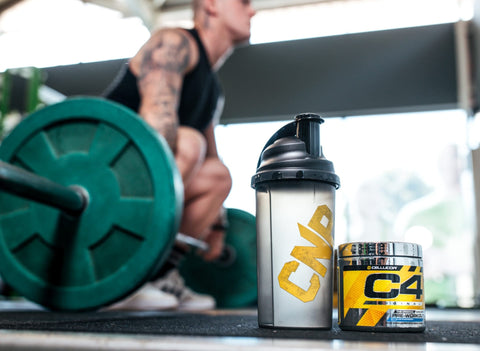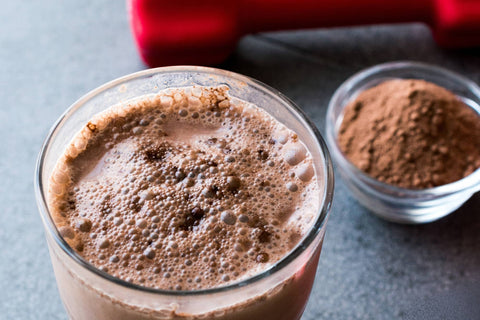Fitness enthusiasts often face a stagnant period in their muscle growth. Despite tracking every calorie, protein, carb, and fat gram, achieving the desired gains remains challenging.
In such a case, adding mass gainers to your nutritional strategy might just be the game-changing solution for you!
What Are Mass Gainers?
Mass gainers are nutritional supplements that offer a high-calorie mix of proteins, carbohydrates, and fats. The main goal of mass gainers is to provide extra calories and nutrients that you might not get from food alone. Unlike regular protein shakes focused mainly on protein intake, mass gainers include a large number of calories in a single serving to fuel muscle gains alongside workouts.
In addition to calories, mass gainers can also contain vitamins, minerals, and amino acids to support overall health and improve recovery time after workouts.
Understanding the Components of Mass Gainers
Mass gainers are formulated with specific components to maximize muscle growth and overall health. Each ingredient is carefully chosen to provide the optimal balance of nutrients needed to fuel your workouts and recovery.
Protein
Protein is the primary component of a mass gainer. It's composed of amino acids, the building blocks that help build and repair muscle tissues after an intense workout.
High-quality mass gainers often include a blend of different proteins such as whey, casein, and sometimes plant-based options to ensure a steady supply of amino acids to your muscles. This blend helps maintain muscle protein synthesis over time, which is critical for growth and recovery.
Carbohydrates
Carbohydrates are your body's main source of energy. In mass gainers, they help refuel the body’s glycogen stores, which are used up during intense training sessions. By restoring these stores, carbohydrates help reduce recovery time, enhance energy levels, and improve overall performance.
Fats
Fats in mass gainers are not just filler calories. Their presence helps absorb vitamins A, D, E, and K in the body. Fats also supply the body with essential fatty acids that it cannot produce on its own. Moreover, fats play a key role in hormone regulation, including testosterone, which is crucial for muscle growth.
When searching for mass gainers, look for ones that contain healthy fats from sources like MCT oil, flaxseeds, or avocados.
Vitamins and Minerals
These micronutrients support a wide range of body functions that support muscle growth and overall health. A quality mass gainer will offer a blend of these micronutrients, each contributing unique benefits:
- Vitamin D: Enhances calcium absorption, which helps maintain strong bones and skeletal health.
- Calcium: Supports the body's framework and enables more effective workouts.
- Magnesium: Facilitates muscle function and relaxation, aids in energy production, and supports protein synthesis, all necessary for muscle recovery and growth.
- B Vitamins: Vital for converting food into energy so that your body efficiently uses the nutrients you consume. It also supports red blood cell production, which is crucial for oxygen delivery to muscles during workouts.
How to Choose the Right Mass Gainer?
Choosing the right mass gainer is essential to ensure you're supporting your fitness goals effectively. Here are key factors to consider when selecting a mass gainer that's right for you:
- Understand Your Caloric Needs: Before adding a mass gainer to your diet, calculate your daily caloric needs to gain weight. A mass gainer should help you meet these needs, especially if you struggle to do so through food alone.
- Check the Protein-to-Carbohydrate Ratio: Depending on your fitness goals, you may want a higher protein content with fewer carbs or a more balanced ratio. For lean muscle gain, look for a higher protein content. For overall mass gain, a balanced ratio of protein to carbs is beneficial.
- Consider the Type of Protein Used: The quality of protein matters. Look for gainers that use high-quality protein sources such as whey, casein, or a blend of both to ensure your body receives the best nutrients for recovery and growth.
- Inspect the Fat Content and Sources: Healthy fats are crucial. Opt for mass gainers that include heart-healthy fats from sources like MCT oil, flaxseeds, or avocados. Avoid products with trans fats or excessive saturated fats.
- Look for Additional Nutrients: A good mass gainer will include extra vitamins, minerals, and amino acids to support overall health, muscle recovery, and growth. Check the label for added BCAAs, vitamins D and B, calcium, and magnesium.
- Flavour and Mixability: Since you'll be consuming your mass gainer regularly, choose a flavour you enjoy and a product that mixes well with water or milk for a pleasant taste and experience.
- Read Reviews and Recommendations: Before making a purchase, read reviews from other users and seek recommendations from trusted sources. This can provide insight into the product's effectiveness and taste.
How to Include Mass Gainers in Your Diet?
Incorporating mass gainers into your diet effectively requires a strategy that aligns with your overall fitness goals and nutritional needs. Here are the steps to follow:
- Determine Your Daily Caloric Intake: First, calculate your daily calorie needs based on your activity level, current weight, and muscle gain goals. This will help you understand how much of your caloric intake should come from mass gainers.
- Choose the Right Time: Timing is key. For many, consuming a mass gainer post-workout is ideal, as this is when your body is most in need of nutrients for recovery and growth. Others may prefer it as a meal replacement or supplement to meals to ensure they meet their caloric needs throughout the day.
- Start with a Half Serving: If you’re new to mass gainers, begin with a half serving to see how your body responds. Gradually increase to a full serving as your body adjusts to the higher caloric intake.
- Mix with Water or Milk: For additional calories, mix your mass gainer with milk (dairy or plant-based) instead of water. This also improves the taste and texture.
- Blend with Other Nutrients: Improve the taste and nutritional power of your mass gainer shake by blending it with fruits, nuts, seeds, or nuts.
- Maintain a Balanced Diet: Include plenty of fruits, vegetables, lean proteins, and whole grains alongside your mass gainer.
- Monitor Your Progress: Keep track of your weight, body composition, and overall health as you incorporate mass gainers into your diet. Adjust your intake based on your progress and goals.
- Stay Hydrated: High-calorie diets can increase your need for hydration. Drink plenty of water throughout the day to support digestion and overall health.
Potential Side Effects of Mass Gainers
With any health supplement, it's important to be aware of potential side effects that may arise from their use. Here's what to look out for when taking mass gainers.
Digestive Issues
Due to their high calorie and nutrient density, mass gainers can sometimes lead to bloating, gas, and other digestive discomforts. Starting with a smaller serving and gradually increasing can help your digestive system adjust.
Unwanted Weight Gain
If not used carefully in accordance to your caloric needs and activity level, mass gainers can lead to weight gain rather than lean muscle mass. Monitoring your overall calorie intake and adjusting based on your physical activity can help prevent this issue.
Check the Ingredient
When selecting a mass gainer, choose low-sugar options to avoid energy spikes and potential health issues. You should also check the ingredient list for common allergens such as dairy, soy, or gluten, especially if you have dietary restrictions or sensitivities.
FAQs About Using Mass Gainers
Can mass gainers help with weight loss?
Yes, you can make mass gainers a part of your weight loss strategy. For instance, replacing a meal with a mass gainer shake could help control calorie intake while still providing essential nutrients. However, make sure to choose a shake low in sugars and fats to support your overall calorie deficit plan.
Are mass gainers suitable for vegetarians or vegans?
Yes, there are vegetarian and vegan mass gainers available on the market. These products use plant-based protein sources like pea, rice, and hemp protein instead of dairy-based proteins.
How long should I use mass gainers?
The length of time you should use a mass gainer varies based on your fitness objectives and progress. You might use it for several months to initiate muscle growth or include it as a staple in your diet for ongoing support. Make sure to monitor your progress frequently and adjust the dosage as needed.
Can mass gainers replace whole food?
No, mass gainers should not completely replace whole foods in your diet. It should be used in conjunction with a balanced diet to ensure optimal health and muscle growth.
Ready to Transform Your Physique?
As you can see, mass gainers are a powerful supplement for overcoming the common plateau that occurs during a fitness regime. The right blend of mass gainer ensures that your body receives the additional nutrients needed for muscle gain that might be missing from your regular diet.
But remember, the mass gainers and other workout supplements should complement a balanced diet, not replace it! Pay attention to your body's response, adjust your intake as needed, and always prioritize whole foods for the majority of your nutritional needs.
If you're looking to boost your muscle mass and need that extra calorie supply, explore our selection of mass gainers. Our products are carefully formulated with essential nutrients to support your fitness journey. Choose the right mass gainer and take the next step in your muscle-building journey today.



